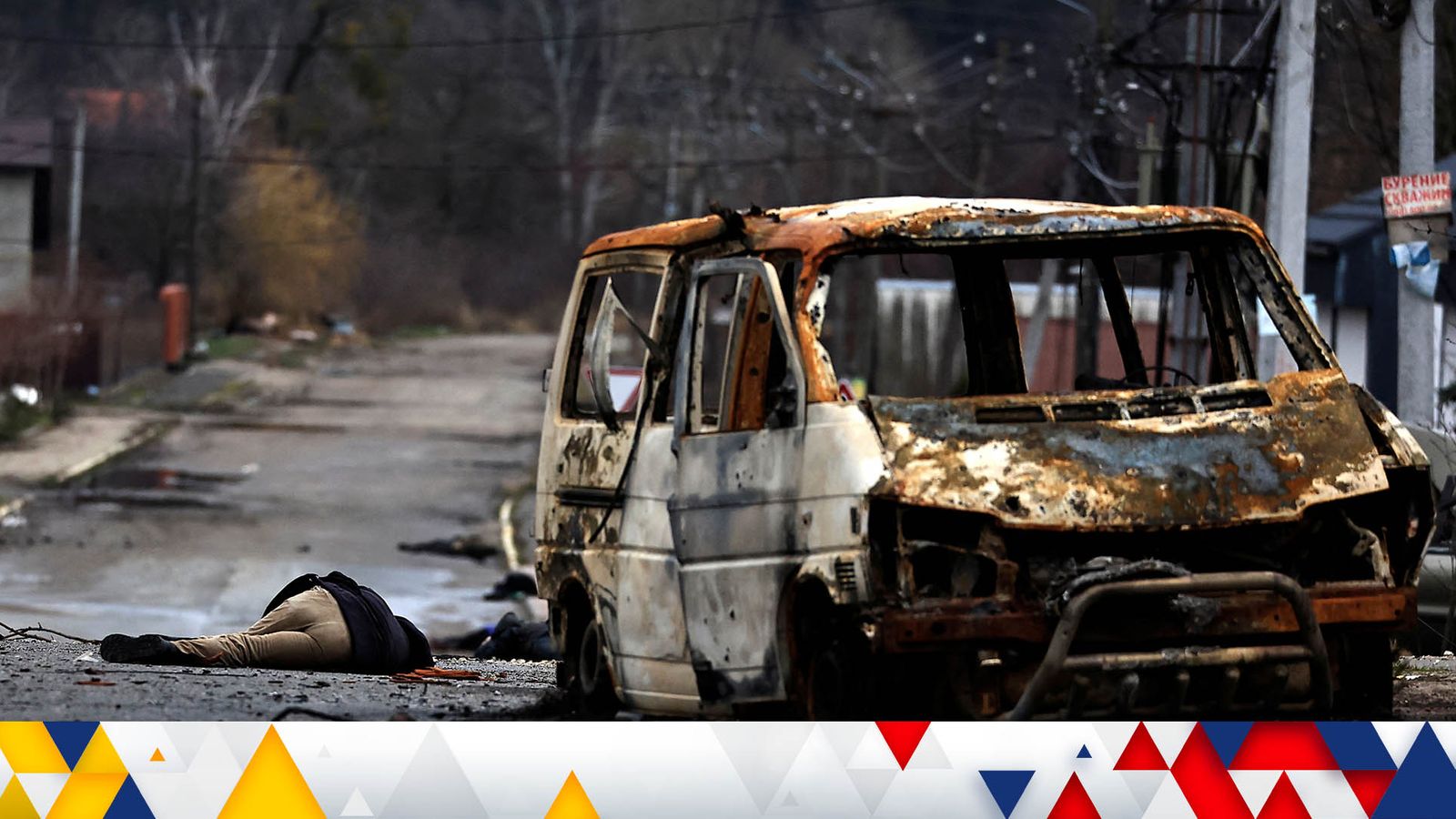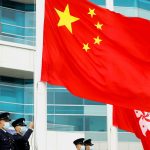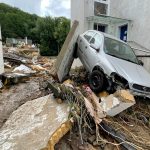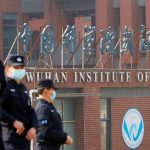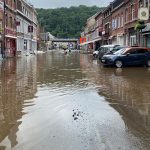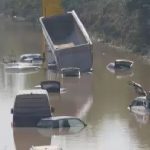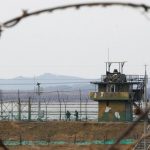After Russian troops withdrew from Kyiv and the surrounding region last week, the scale of civilian casualties there is now being laid bare.
Images from the commuter town of Bucha, just outside Kyiv, show dead bodies with their hands tied behind their backs – seemingly shot at close range.
‘Unspeakable horrors in liberated towns’ – follow Ukraine updates live
Satellite imagery has also revealed a makeshift mass grave outside a church in the town.
Ukrainian President Volodymyr Zelenskyy has described the evidence emerging from Bucha as “genocide” and says the UN Security Council meeting on Tuesday will discuss potential war crimes by Russian forces.
Moscow has denied all such accusations and says the casualties in towns such as Bucha were the result of “blatant provocations by Ukrainian radicals”.
Here Sky News takes a closer look at what has been found in Bucha and whether it could constitute war crimes.
Ukraine war: Russian soldiers accused of carrying out ‘genocide’ in Bucha as Zelenskyy says ‘concentrated evil has visited our land’
Ukraine war: Zelenskyy accuses Russia of ‘genocide’ as Western leaders condemn ‘despicable’ civilian killings
Ukraine war: Russian troops have dug up Chernobyl’s poisonous legacy – and they may have taken it into their own country
Where is Bucha?
Bucha is a town of around 36,000 people roughly 16 miles northwest of Kyiv in the wider Kyiv region.
“It’s hard to imagine, but Bucha was a popular commuter town,” Deborah Haynes, Sky News security and defence editor who is on the ground there, says.
“Young couples chose to move here, where property is more affordable, to start a family. The town centre is lined with shops… there are schools, nurseries and parks.”
As the Russians advanced towards Kyiv in March, however, Bucha became a key battleground.
Read more:
Mass graves, torture and broken bodies – the horrors of Bucha have been laid bare
“It was here that Ukrainian forces managed to help slow and then halt the Russian advance towards Kyiv,” Haynes explains.
“The Ukrainians bombed a key bridge, stopping Russian fighting vehicles from being able to easily pass and they smashed the Russian side with artillery.”
The fierce battle for control of the airport near Hostomel was another similar example.
What has been found there now the Russians have retreated?
Russian forces began to withdraw from the Kyiv region on 1 April, with analysts claiming they are running out of resources and choosing to focus on the south and east of the country – where they could create a land corridor to Crimea – instead of the capital.
Now fighting has subsided, journalists and human rights observers have been able to access the town again and witness the devastation left behind.
Please use Chrome browser for a more accessible video player
Sky News has verified two videos showing bodies on the streets of Bucha, including one with at least seven corpses on the pavement.
Photos taken by Associated Press show bodies with hands tied behind their backs and wounds to the back of their heads. Their journalists say they have seen 21 bodies, with at least one group of nine all in civilian clothes.
Satellite images show a 45ft-long makeshift mass grave outside the town’s Church of St Andrew and Pyervozvannoho All Saints.
What are the Ukrainians saying?
The mayor of Bucha, Anatoly Fedoruk, claims more than 300 residents have been killed in the town.
The Ukrainian military has also said Russian forces used the basement of one house there as a torture chamber.
Mr Zelenskyy said in his daily address on 4 April: “To talk about the discoveries in Bucha and our other cities from where the occupiers were expelled.
“Hundreds of people killed, tortured, executed civilians. Bodies on the streets. Booby-trapped area. Even the bodies of the dead are booby-trapped.
“Concentrated evil has visited our land. The killers, executioners, rapists, marauders who call themselves an army – and who deserve only death after what they’ve done.”
Wladimir Klitschko, whose brother Vitali is the mayor of Kyiv, described the scenes in Bucha as “genocide of the Ukrainian people”.
Could what happened in Bucha constitute a war crime?
The images from Bucha have prompted international condemnation and offers of bolstered support to Ukraine from the UK, EU and US.
Michelle Bachelet, the UN High Commissioner for Human Rights, said she was “horrified” and that the images raise “serious and disturbing questions about possible war crimes, grave breaches of international humanitarian law and serious violations of international human rights law”.
Members of the UN Security Council will meet on Tuesday, when Mr Zelenskyy claims war crime prosecutions will be discussed.
The Ukrainian authorities, aided by Western intelligence officials and groups such as the investigative journalism group Bellingcat and the human rights organisation Amnesty International, have been compiling evidence for potential war crimes prosecutions from the very start of the conflict.
Subscribe to the Daily podcast on Apple Podcasts, Google Podcasts, Spotify, Spreaker
Rules on international warfare were agreed after the Second World War as part of the 1949 Geneva Conventions, which were signed by all members of the UN – including Russia.
Cases of potential breaches are presided over by the International Criminal Court (ICC).
The UN definition of a war crime is a serious breach of international humanitarian law committed against civilians or “enemy combatants” during an armed conflict.
The ICC lists examples such as “intentionally directing attacks… against individual civilians not taking direct part in hostilities” and “attacking or bombarding, by whatever means, towns, villages, dwellings or buildings which are undefended and which are not military objectives”.
Professor Michael Clarke, a military analyst and former director-general of the security think tank RUSI, told Sky News that like several others since the start of the invasion, the Russian attack on Bucha could easily fit the criteria for a war crime.
“The deliberate targeting of civilians is a war crime, in and of itself, every day of the week,” he said.
“Civilians who appear to have had their arms tied behind their back and shot – there is no strategic rationale for that whatsoever.”
What about claims of genocide?
Both President Zelenskyy and Wladimir Klitschko have claimed there is now evidence of genocide by the Russians in Bucha.
Human rights lawyer Mark Guthrie told Sky News that war crimes – as prosecuted by the ICC – largely come under three categories depending on what evidence there is.
Please use Chrome browser for a more accessible video player
Genocide is the most serious and requires proof of a “concerted effort to wipe out a national group”, such as those against Jews in Nazi Germany and the Tutsi minority in Rwanda.
Crimes against humanity, meanwhile, constitute a “systematic attack or murder of people”.
There are then grave breaches of the Geneva Conventions, which include any attacks on civilians or civilian targets.
Could Putin be prosecuted?
In 2017 a fourth category of war crime – aggression – was agreed by the ICC to make the prosecution of political leaders themselves easier.
It enables the court to “hold leaders individually criminally responsible for waging an aggressive war”, which is defined as “the use of armed force by a state against the sovereignty, territorial integrity or political independence of another state”.
But Mr Guthrie warns that “getting Vladimir Putin to stand trial is going to be very, very difficult” as the ICC has no jurisdiction in Russia and he is unlikely to leave the country.
“Even if you were trying Putin for war crimes at the International Criminal Court, there is a problem in that he’s in Russia and he’s not going to voluntarily surrender.
“It’s not going to be easy to put anyone at the top level on trial… but it may be easier at the bottom level”.
Read more:
Could Putin stand trial for war crimes?
He added: “This is not going to happen soon. Unfortunately it’s going to be a long time in the future.”
Previous prosecutions of world leaders for war crimes, including Saddam Hussein in Iraq and Radovan Karadzic in Bosnia, took years, if not decades.
What is Russia saying?
Russia has repeatedly denied any war crimes in Ukraine, with its defence ministry claiming that “not a single civilian” in Bucha faced any unprovoked, violent military action.
They said the images of dead bodies in the town have been “stage managed by the Kyiv regime for the Western media”.
Instead Moscow’s first deputy envoy to the UN, Dmitry Polansky, described what happened in Bucha as a “blatant provocation by Ukrainian radicals”.
He has reportedly called for a meeting with UN this week.
Professor Clarke said Russia “always deny everything”.
Please use Chrome browser for a more accessible video player
“They go through three phases,” he told Sky News.
“They deny everything, then they try to obfuscate and then a couple years later they often admit it… and say ‘yes we did do that, but you do the same’, pointing to some kind of moral equivalence in the West.
“They did it over the poisoning of Alexander Litvinenko in 2006, Sergei Skripal in 2018 and the shooting down of civilian airliners over Ukraine in 2013/2014.”
Professor Clarke added that the horrifying images in Bucha are likely the result of “Russian soldiers out of control… working in their own little friendship groups”.
“Russian troops famously have a low level of non-commissioned officers – who are there to keep the troops in order and are in charge of their behaviour.
“It looks a classic case of Russian soldiers out of control – vengeful because people in Bucha opposed them and said they were going to continue with their daily lives.”
